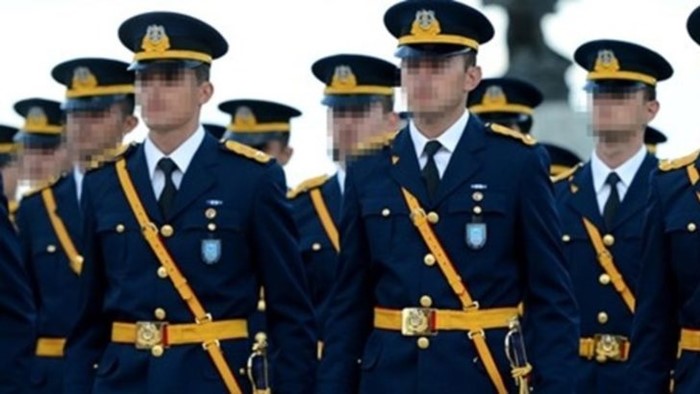An Istanbul court on Friday handed down life sentences to 57 air force cadets and aggravated life imprisonment to six others for their alleged role in a failed coup attempt on July 15, 2016, the state-run Anadolu news agency reported.
The 28th High Criminal Court in Silivri acquitted two suspects while ruling for the continued imprisonment of 63 defendants.
In January, another İstanbul court ruled for aggravated life sentences for 23 military members and life sentences to 35 military personnel for attempting to change the constitutional order by means of the coup attempt in July 2016.
The court also handed down prison sentences of between 11 years, eight months, and 16 years to 16 military members for “attempting to kill people,” and prison sentences of between four and five years to 56 military personnel for “illegally preventing a broadcaster from broadcasting.”
Acquitting 35 military members, the court also sentenced two officers and a cadet to three years for insulting President Recep Tayyip Erdoğan.
The air force cadets said they were taken to Istanbul in buses from Yalova and that they did not know they were part of a coup attempt.
The cadets said the only surprising thing on July 15, 2016 was an unplanned morning visit by Air Forces Commander Gen. Abidin Ünal to their training camp in Yalova.
Turkish media reported claims that during a speech to cadets in Yalova on July 15, Ünal underlined the importance of carrying out the orders of their commanders.
Columnist Ahmet Nesin on Jan. 17 wrote on the Artıgerçek news website that during his unplanned visit Ünal told the commander of the camp to cancel all training activities in the afternoon: “He told the commander, ‘Do not tire the boys, they will get tired this evening’.”
Relatives of the soldiers were shocked by the verdicts.
Turkey survived a military coup attempt on July 15, 2016 that killed 249 people and wounded more than a thousand others. Immediately after the putsch, the Justice and Development Party (AKP) government along with President Erdoğan pinned the blame on the Gülen movement.
Fethullah Gülen, who inspired the movement, strongly denied having any role in the failed coup and called for an international investigation into it, but President Erdoğan — calling the coup attempt “a gift from God” — and the government initiated a widespread purge aimed at cleansing sympathizers of the movement from within state institutions, dehumanizing its popular figures and putting them in custody.
The ruling AKP government dismissed 24,977 military members including 150 generals, 4,630 officers, 2,167 noncommissioned officers, 1,210 specialized sergeants, 411 civil servants and workers, and 16,409 cadets following the failed coup over alleged links to the Gülen movement.
Defense Minister Nurettin Canikli on April 18 said the government has identified 3,000 active duty military officers suspected of links to the Gülen movement and that they would be dismissed with a government decree in the coming days.
The government has up until now employed 15,850 military personnel including 1,763 officers, 4,135 noncommissioned officers, 3,698 specialized sergeants, 6,162 contracted privates and 92 civil servants, the report said.
The Turkish government announced on Jan. 2 that it would enlist 42,938 new military personnel. A total of 3,755 officers, 5,375 noncommissioned officers, 13,213 specialized sergeants and 20,595 contracted privates are planned to fill the ranks.
In February 2017 Defense Minister Fikri Işık said 30,000 new recruits would be enlisted in the Turkish military.
Official statements claim that 8,651 military members including cadets and privates took part in the failed coup.
Director General of Public Security Selami Altınok on Dec. 12 said 22,987 police officers have been dismissed over alleged links to the Gülen movement.
“If it was a coup perpetrated by the Gülen movement and 25,000 military personnel and 22,987 police officers were dismissed for their connections to the movement, why did only 8,651 military members including cadets and privates participate in the coup?” is a question being asked by critics.
In February of last year Henri Barkey, director of the Middle East Program at the Washington-based Wilson Center, said that many generals purged by the Turkish government are pro-NATO and pro-American, saying this could create a shift in Turkey-NATO relations.
The head of Germany’s Federal Intelligence Service (BND), Bruno Kahl, last year said Turkey could not convince them that US-based Turkish-Islamic scholar Gülen was behind the failed coup in July.
Similarly, Devin Nunes, chairman of United States House Permanent Select Committee on Intelligence, said he has not seen any evidence showing Gülen’s involvement in the putsch in Turkey.
In addition, a report prepared by the EU Intelligence Analysis Centre (IntCen) revealed that the coup attempt was staged by a range of Erdoğan’s opponents due to fears of an impending purge.


